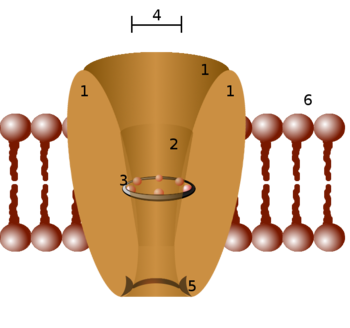Membrane Channels & Pumps
From Proteopedia
Membrane Channels & Pumps are two families of biological membrane proteins which allow the passive and active transport respecitvely of various biological compounds across membrane barriers.
Articles in Proteopedia concerning Membrane Channels & Pumps include:
- Chloride Ion Channel
- Chloride Ion Channel Analysis
- Glutamate Receptor
- Gramicidin Channel in Lipid Bilayer
- M2 Proton Channel
- Mechanosensitive Channels: Opening & Closing
- Proton Channels
- Voltage-gated calcium channels
To view automatically seeded pages concerning Membrane Channels & Pumps See:
- Ion Transport
- Ligand Channel
- Mechanosensitive Channel
- Potassium Channels
- Proton Pump
- Transport Proteins
Membrane Transport Proteins
350px|right|thumb| Model of Lactose Permease Membrane Transport Proteins are proteins involved in the movement of ions, small molecules, or macromolecules, across biological membranes.
Articles in Proteopedia concerning membrane transport proteins include:
- A Physical Model of the β2-Adrenergic Receptor
- Lactose Permease
- Enzyme I of the Phosphoenolpyruvate:Sugar Phosphotransferase System
To view automatically seeded pages concerning Membrane Channels & Pumps See:
Proteopedia Page Contributors and Editors (what is this?)
David Canner, Alexander Berchansky, Eric Martz, Wayne Decatur, Jaime Prilusky

